 |
| The "My Bonnie" LP by Tony Sheridan only contains two songs backed by The Beatles. |
55 years ago – the Beatles recorded “My Bonnie” and 6 other songs in Hamburg in the famous sessions with Tony Sheridan – newly found documents answer some questions.
Article by Thorsten Knublauch
Once in a while a new document turns up and you are happy about it because it sheds new light on a subject. Sometimes documents turn up that raise more questions than they answer… Here is one that answers a lot of questions!
Mark Lewisohn sent me a newly found document recently, because he knows that I have been researching and writing about The Beatles` Hamburg days for years, and he wanted my opinion. This document is called "Künstlerquittung" – "artist receipt" signed by each Beatle and an unknown executive of Deutsche Grammophon.
 |
| Pete Best's artist's receipt (Künstlerquittung). |
Four identical documents exist – one each for John, Paul, George and Pete… Mark was able to get the copies pertaining to George and Pete, and each musician is listed with his Liverpool home address. It is a receipt from Deutsche Grammophon recording company, which documents that each Beatle was paid for five songs recorded in Hamburg during the session of June 22nd/23rd 1961 with Tony Sheridan without receiving any formal rights. It appears to be a standard document for session musicians.
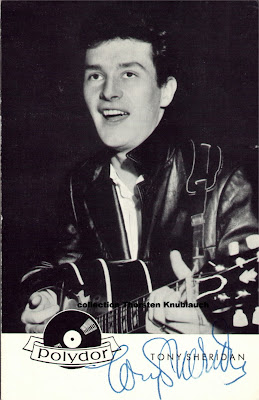 |
| Polydor promotional card for Tony Sheridan. |
This document seems to be the missing link in the Beatles-Sheridan-Polydor-story.
Why is this document so special?
- Over the years it has been written in the books – and perhaps understood by The Beatles themselves - that they had a recording contract with Bert Kaempfert for the "My Bonnie" sessions. But that is not true. Most books claim that the recordings were done for producer Bert Kaempfert, and that he later sold the recordings to Deutsche Grammophon. We notice that this newly found document was issued by Deutsche Grammophon record company and not Bert Kaempfert. In addition to that, although this document is signed by two parties (Deutsche Grammophon and each Beatle) it isn’t a contract – it`s just a receipt.
- It clearly shows that The Beatles were regarded as, and paid as sessions musicians for these recordings.
- We learn for the first time about the amount of money the Beatles received for those recordings – DM 175 in total per person. In the books so far, a total of DM 300 was only ever mentioned, and no source was ever citied.
- There are only five songs mentioned! “Nobody’s Child” and “Take Out Some Insurance On Me, Baby” are missing.
| The "My Bonnie" single. |
What did we know before?
We knew that only those five above named songs were mentioned in the newspaper Mersey Beat in issue No. 2 in the famous “Beatles sign recording contract” article. This information came directly from The Beatles. The four songs except “Ain`t She Sweet” were released before The Beatles had a record contract with Parlophone: Two tracks on the “My Bonnie”/”The Saints” single in Germany on October 23rd 1961 as well as in the UK on January 5th 1962, and all four songs on the French “Mr Twist” EP around January 26th 1962. The other three songs were released for the first time on “The Beatles’ First” LP in Germany in April 1964.
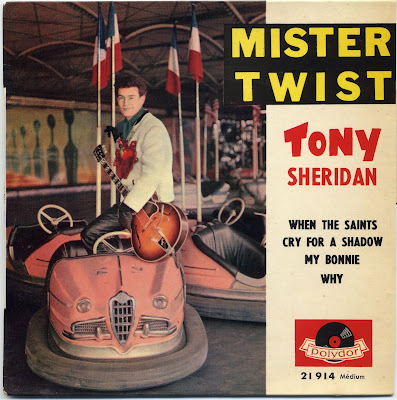 |
| The French "Mister Twist" EP. Re-released earlier this year. |
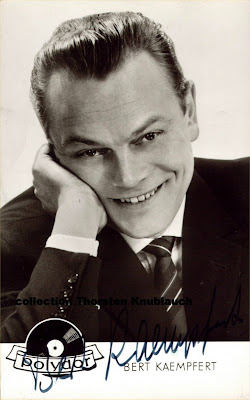 |
| Bert Kaempfert promotional photo card. |
 |
| Contract with Bert Kaempfert Productions. |
When the Beatles were to get a contract with Parlophone they had to terminate that contract with Bert Kaempfert. It wasn`t terminated during the three month period, though, and a dissolution contract needed to be made on June 25th 1962 - the day after The Beatles’ final session for Bert Kaempfert, recording “Sweet Georgia Brown” and the missing “Swanee River”, together with Roy Young. In this dissolution contract the Beatles gave away their rights to the recordings – it does not specifically say which recordings - it was just a disclaimer for all kinds of future demands. The Beatles gave away their rights, and, on the other hand, were released from the obligation to record the above-mentioned number of songs, which, at the time, might have been two additional tracks, since “Sweet Georgia Brown” and “Swanee River” were already on tape. As no other documents were known at the time, the experts weren`t sure if with this contract also the rights to the 1961 recorded songs were given away.
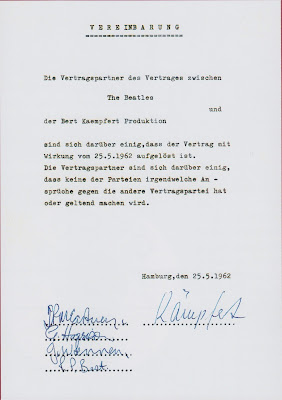 |
| The Beatles get released from their previous contract with Kaempfert. |
What do we know now with the newly found document?
We know now for sure that the Beatles gave away their rights to the above mentioned five songs shortly after the recordings were done in 1961 – or, more precisely: they never had any rights to these songs, as they were only session musicians. They were even seen as session musicians for their own two tracks! For a fee of DM 50 per person they sold away “Cry For A Shadow” and “Ain`t She Sweet”, respectively. As they were only session musicians the record company could have added vocals or more musicians to those tracks without asking– and this was indeed done when the tracks were released in the United States in 1964. They signed this document on June 28th 1961 – the same day that John and George signed away their composers’ rights for “Cry For A Shadow” to Alfred Schacht – most likely for a one-off fee, if any at all (the pages with those details were never published)! Therefore, the Bert Kaempfert contract becoming effective on July 1st 1961 was a contract for NEW recordings, and this was ended with the dissolution contract dated May 25th 1962.
The period between April 1st and June 30th 1961 mentioned in the receipt is almost identical with the engagement at the Top Ten Club Hamburg (lasting until July 1st) but does not make sense what the starting date is concerned. They did not meet Kaempfert before early May 1961!
 |
| Tony Sheridan with The Beatles. |
 |
| Thorsten Knublauch co-authored the book about The Beatles in Germany. |
 |
| George signed away his rights to "Cry For A Shadow" |
But hey – now there are still two questions left! Why are there only five songs listed in the receipt? Could this mean that The Beatles never played on those two other recordings? Was that the reason only five songs were mentioned in Mersey Beat No 2?
OK – no one doubts that the Beatles played on those undocumented tracks. Nor do I, as there was no other recording session with Tony Sheridan in Hamburg at the time, apart from the “My Bonnie” album session in December 1961. Those sessions were done with different musicians in a different studio, and the overall sound and playing appears to be different compared to the sessions with the Beatles.
But why were two songs left out? Even if those songs were not intended to be released at the time I would imagine that they would at least have been mentioned in the receipt. Surely, if they had wanted to save money at the time Deutsche Grammophon would never have paid for material that was not supposed to be published, and this is the only reason I can imagine why they are not mentioned…
Some experts theorise that those two missing songs were only given to Polydor after the success of the Beatles from the archive of Bert Kaempfert and were to be released in April 1964. I totally agree with that because there are three clues suggesting it:
| "Twist" added to capitalise on the new fad. |
- Secondly, those songs were missing in the receipt.
- And there is a third clue – and previously most likely a misinterpretation. In “Beatles Bop” the sound engineer Richard Moore has checked the sound picture of all recorded songs from that first session. He claims that the sound picture of “Nobody’s Child”, “Take Out Some Insurance On Me, Baby” and “Ain`t She Sweet” is different from those other four tracks - perhaps because of a different setting in the studio. His conclusion is that those three tracks were recorded on a different day (in other words: the second day of the session). I am no expert in those details and I can’t prove it, and, as stated above, still believe that one day was enough to record seven songs – but all three songs were not released shortly after the session, but more than two years later. Is it possible that they were mixed or (in case of “Ain`t She Sweet”) remixed much later to be included in “The Beatles’ First”, which resulted in a different sound picture than the songs mixed directly after the session?
To cut a long story short: Kaempfert delivered only five songs to Deutsche Grammophon, and they only paid The Beatles for five songs at the time. That is the simple reason why there are only five songs listed on the document… Strange but lucky for us that the tapes were never wiped.
And this leads to the final question: There is no known contract or receipt between either Bert Kaempfert and The Beatles nor Deutsche Grammophon and The Beatles for a financial compensation for “Nobody’s Child” or “Take Out Some Insurance On Me, Baby”!
There is no doubt that Tony Sheridan was paid for those two tracks when they were finally released – even though his Polydor contract only guaranteed him small percentages, which annoyed him until his death.
The Beatles only got their session fee for the five songs recorded in 1961 as proven by that newly found document! The dissolution contract of 1962 was only valid for the songs recorded in May 1962. The two 1961 leftover songs were first released in April 1964 on “The Beatles’ First” and rereleased extensively ever since.
Looks like it might be a good idea for Pete, Paul, Olivia and Yoko to get a date with their lawyers, doesn’t it?
Thorsten Knublauch, author of Komm, gib mir Deine Hand – Die Beatles in Deutschland 1960 -1970 and Bravo-Beatles-Blitztournee
Additional sources:
Komm, gib mir Deine Hand – Die Beatles in Deutschland 1960 -1970 by Thorsten Knublauch & Axel Korinth
Tune In
Facts & Fiction by Eric Krasker
Beatles Bop
Many thanks to Mark Lewisohn, Joachim Noske and Eric Krasker.
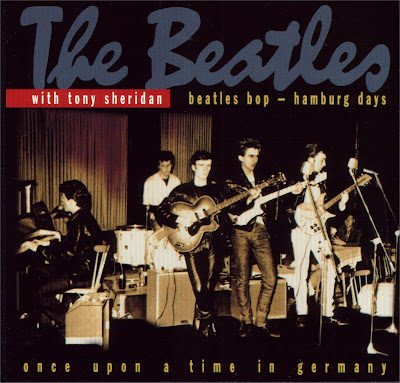 |
| Bear Family's "Beatles Bop" boxed set contains the recordings, as well as photos of important documentation. |

















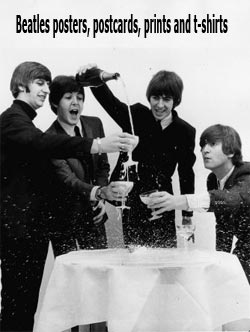














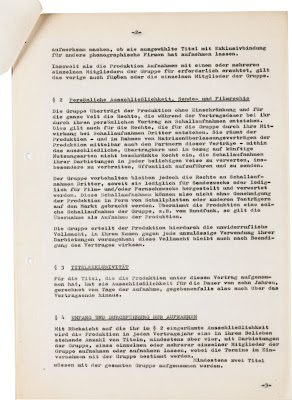



6 comments:
Well, no one has commented yet, but for me this is exactly the kind of story that interests me the most. Documentation, especially when the key actors are dead or can't remember, is the key to building an increasingly accurate account of history. It's also a good example of how Lewishon's work will never be finished because he has already said in an interview that he will have to revise some aspects of volume 1 of Tune In.
OK, it may not be the most important set of questions about the Beatles early history, but I for one was frustrated that the Polydor recordings could not be definitely identified, nor a complete account provided forwhen they were recorded. This moves the debate on for sure.
Is Nobody's Child the same song, later recorded by the Wilburys.
https://www.youtube.com/watch?v=AzkpPnPWRL4
https://www.youtube.com/watch?v=6SqF56nj2LU
They are the same, but quite different arrangements.
Ringo's mother Elsie always requested "Nobody's Child" at the family parties, and he would sing it to her. ;-)
So The Wilburys covered a song from the Beatles Hamburg repetoire
Interesting that "Cry for a Shadow" is listed as "Cry for a Shadow" on the receipt, and not as "Beatle Bop". I believed that Polydor re-named it without the Beatles' knowledge, shortly before it was released, but on this evidence, it was going by that name already and the group would have known.
Post a Comment